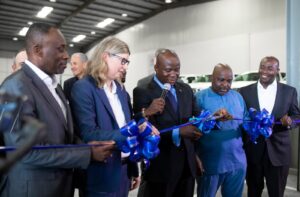Volkswagen Ghana, the first automobile entity to start local production of automobiles in the country, has officially opened its upgraded assembly plant located at the Free Zones enclave in Tema-Accra.
The huge edifice, which is fully installed with ultra-modern assembling equipment, has the capacity to produce over 7,000 different models of the VW brand of vehicles in a year to serve the country and the sub-region.
The multimillion investment to move the production from the previous North Industry area base to the Free Zones enclave has now purged the company’s total investment in the Ghanaian automobile industry since 2020 to date at £8 million.

Since its establishment in 2020, the company has produced over 1,200 vehicles here in the country, with about 20 percent of these vehicles sold to other countries including Cote D’Ivoire, Senegal, and Kenya.
Caretaker Minister of Trade and Industry, Samuel Abu Jinapor, speaking at the inauguration, ceremony commended the management of the company for taking the leading step to set up in the country, especially in the midst of the pandemic in 2020. He mentioned that the government is committed to fulfilling its promise to make the automotive manufacturing industry in Ghana the regional hub for car assembly and boost car sales in the local and regional markets.
“Government committed to developing a comprehensive automotive industry policy to among others incentivise and facilitate vehicle manufacturing and assembly in Ghana, including a preferential procurement policy for locally assembled vehicles. This policy cabinet has approved in 2019 to attract investment into the space.
Currently, there are six automobile equipment and assembly plants in the country producing nine different brands of vehicles for the local and international market whilst creating jobs for the youth of the country,” he said.

He added that the industry is a stimulant of economic growth and a key driver of employment, foreign and domestic investment, local supply chain development, innovation, and technology transfer, as such, the government will continue to put in place policies that will create a conducive environment for local assembling plants to thrive.
Managing Director of Volkswagen Ghana, Jeffrey Oppong Peprah, mentioned that the facility would assembly six brands of different salon and sports utility vehicles (SUVs) including Polo, Tiguan, Passat, Teramont, Amarok, Caddy brands, and the T-Cross.
“In 2020 when we started, we were producing in a third-party facility but what we see today is a scale-up to improve our capacity and show our commitment to developing the automobile industry in Ghana and the sub-region.
The new location is strategically advantageous to the company due to its closeness to the port as well as space-wise to give room for innovation and future expansion,” he said.
The MD also mentioned that the company is interested in leveraging the African Continental Free Trade Area (AfCFTA) to expand operations in terms of supply to the entire sub-region.
The new facility, he said would also create more jobs for technical support personnel and retailers across Ghana.
MD of VW South Africa, Martina Biene, on her part mentioned that Volkswagen is reaffirming its commitment to the development of the automotive industry in Ghana and with this move, is also taking over the new vehicle assembly responsibility from its licensed importer in Ghana, Universal Motors Limited (UML)
“Ghana is an important market for our Sub-Saharan Africa expansion plans, especially in West Africa, where we have identified opportunities for developing a collaborative automotive industry hub amongst the countries in the region.
The hub concept will ensure that each country with an automotive development policy or economic interest in the automotive industry has an important role to play in the supply value chain. We believe AfCFTA will be the catalyst that will unlock trade barriers and promote regional collaboration amongst the countries,” she said.










